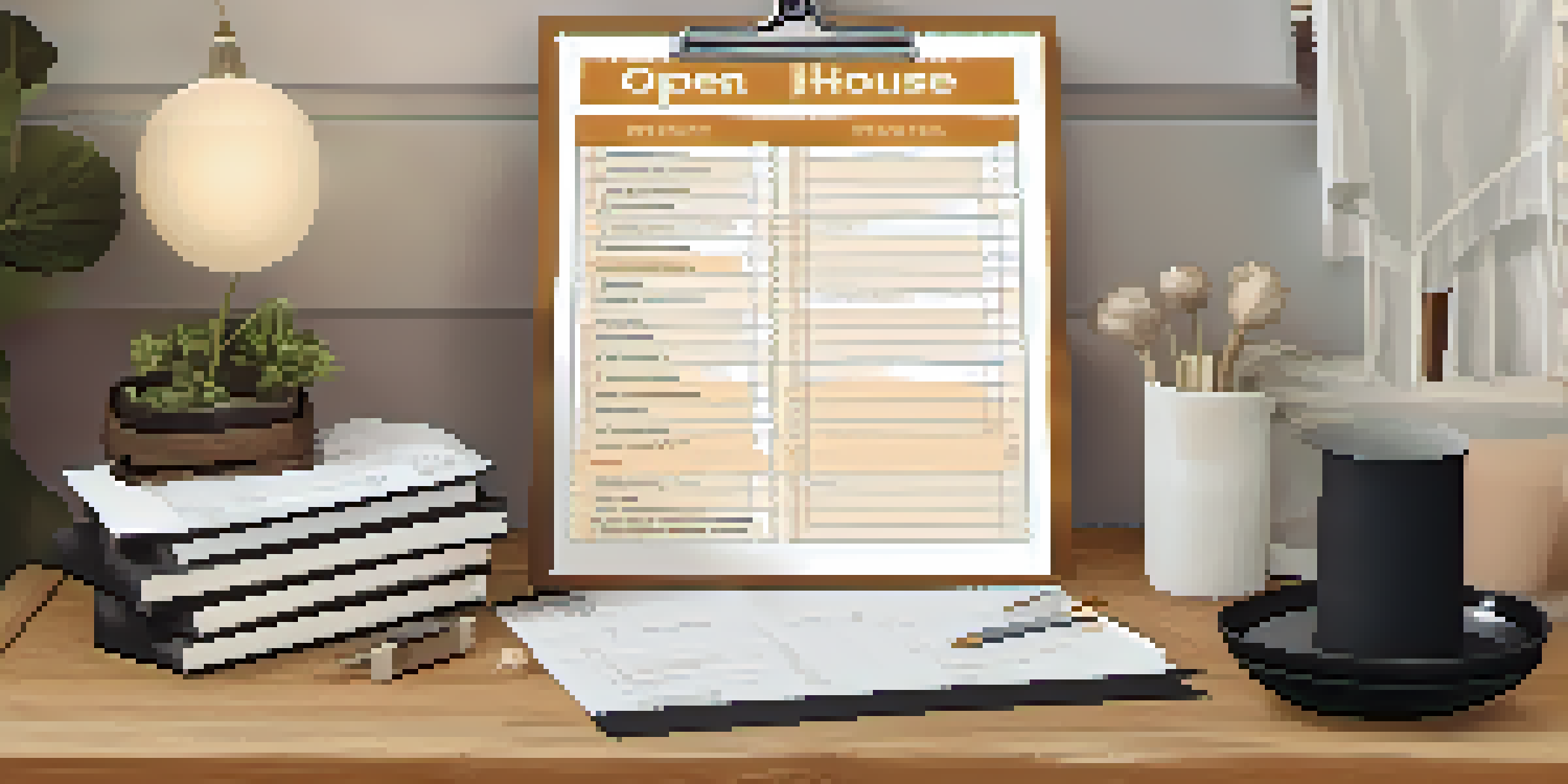Creating an Open House Checklist for Potential Buyers

Understanding the Importance of an Open House Checklist
An open house checklist is a vital tool for potential buyers. It helps streamline the home viewing process, ensuring that nothing essential gets overlooked. Think of it as a roadmap guiding you through the journey of finding your dream home.
The best way to predict the future is to create it.
Having a checklist not only keeps you organized but also reduces the stress that often accompanies house hunting. With so many properties to see, it's easy to forget details about each one. The checklist serves as a reliable companion to track what you loved—and what you didn’t.
Ultimately, this checklist empowers buyers to make informed decisions, enhancing their overall experience. By preparing ahead, you'll feel more confident and ready to engage with real estate professionals.
Key Features to Include in Your Checklist
When creating your open house checklist, start by listing key features you desire in a home. This might include the number of bedrooms, bathrooms, or specific amenities like a backyard or garage. By defining your must-haves, you narrow down your options effectively.

Next, consider including aspects related to the neighborhood and location. Factors like proximity to schools, parks, and shopping centers can heavily influence your decision. Having a section dedicated to these features will help you assess the overall fit of each property.
Importance of a Checklist
An open house checklist helps streamline the home viewing process and reduces stress for buyers.
Lastly, don't forget to include space for notes and observations. This allows you to jot down your impressions and any additional questions you might have about the home. A well-rounded checklist will give you a comprehensive view of each property.
Questions to Ask During an Open House
Asking the right questions can significantly enhance your open house experience. Inquire about the age of the roof, heating and cooling systems, and any recent renovations. These details can give you insight into potential future costs and maintenance.
Success usually comes to those who are too busy to be looking for it.
It's also beneficial to ask about the neighborhood dynamics. Questions regarding crime rates, local schools, and community events can help you gauge whether the area aligns with your lifestyle. Engaging with the hosting agent can provide valuable information beyond what you see during the tour.
Lastly, don’t hesitate to ask about the seller’s motivation. Understanding why they are selling might give you an edge in negotiations later on. This openness can sometimes reveal additional context that can influence your offer.
Visual Elements to Observe at Each Property
During an open house, your eyes can be your best asset. Take note of the property’s layout and flow. Is it conducive to your lifestyle? Pay attention to how rooms connect and whether the space feels welcoming and functional.
Next, inspect the condition of finishes and fixtures. Look for signs of wear and tear, such as peeling paint, cracked tiles, or outdated appliances. These visual cues can inform you about the level of maintenance the home has received.
Key Features to Assess
Including desired home features and neighborhood aspects on your checklist aids in effective decision-making.
Lastly, don’t overlook the outdoor space. A well-kept yard can enhance your living experience, while an overgrown garden might signal future work. Observing these visual elements will help you assess the property beyond just its aesthetic appeal.
Documenting Your Open House Visits
After visiting various open houses, documenting your experiences becomes crucial. A simple way to do this is by taking photos of each property. Visual reminders can help jog your memory when comparing homes later.
Additionally, jot down your feelings and impressions right after each visit. Capture what stood out to you, both positively and negatively. This will create a clearer picture of your preferences as you progress in your search.
Finally, consider using a spreadsheet or app designed for tracking real estate visits. This tech-savvy approach can streamline the process, allowing you to organize your notes and photos efficiently.
Evaluating Your Checklist After Visits
Once you’ve gone through several open houses, it's time to evaluate your checklist. Take a moment to reflect on what features were most important to you and whether they changed after seeing various properties. This self-assessment can refine your search moving forward.
Consider discussing your findings with a trusted friend or family member. Sometimes, an outside perspective can highlight aspects you might have overlooked. They may also provide valuable feedback that can help clarify your priorities.
Flexibility is Essential
Being open to compromise during your home search can lead to unexpected opportunities and the right fit.
Finally, adjust your checklist as necessary. If certain features no longer seem as important, or if new priorities have emerged, update your checklist accordingly. This adaptability is key to navigating the real estate market effectively.
Staying Flexible in Your Home Search
While having a checklist is essential, staying flexible during your home search is equally important. The reality is that the perfect home might not tick every box on your list. Being open to compromise can lead you to unexpected treasures.
For instance, you might find a home that has fewer bedrooms than you initially desired but offers a fantastic location or a spacious yard. Sometimes, the heart knows what it wants, even if it doesn’t match the checklist perfectly.

Ultimately, embracing flexibility allows you to explore various options and might even lead you to your dream home unexpectedly. It’s all about finding the right balance between your needs and the opportunities the market presents.
Final Thoughts on Your Open House Journey
As you wrap up your open house journey, remember that this process is as much about exploration as it is about finding a home. Each visit teaches you something new about what you want and need. Embrace the learning curve and enjoy the ride.
Your open house checklist is a valuable tool that can guide you through the often overwhelming process of buying a home. With thoughtful preparation and a positive mindset, you can navigate the real estate landscape confidently.
Importance of an Open House Checklist
An open house checklist helps streamline the home viewing process, ensuring that essential details aren't overlooked.
In the end, the home you choose should resonate with your lifestyle and aspirations. Trust your instincts, stay organized, and allow your checklist to enhance your journey toward homeownership.